The Oxford Introductions to U.S. Law
Constitutional Law
The Oxford Introductions to U.S. Law
Constitutional Law
MICHAEL C. DORF WITH TREVOR W. MORRISON
Dennis Patterson, Series Editor
The Oxford Introductions to U.S. Law


Oxford University Press, Inc., publishes works that further Oxford Universitys objective of excellence in research, scholarship, and education.
Oxford New York Auckland Cape Town Dar es Salaam Hong Kong Karachi Kuala Lumpur Madrid Melbourne Mexico City Nairobi New Delhi Shanghai Taipei Toronto
With offices in Argentina Austria Brazil Chile Czech Republic France Greece Guatemala Hungary Italy Japan Poland Portugal Singapore South Korea Switzerland Thailand Turkey Ukraine Vietnam
Copyright 2010 by Oxford University Press, Inc.
Published by Oxford University Press, Inc.
198 Madison Avenue, New York, New York 10016
Oxford is a registered trademark of Oxford University Press
Oxford University Press is a registered trademark of Oxford University Press, Inc.
All rights reserved. No part of this publication may be reproduced, stored in a retrieval system, or transmitted, in any form or by any means, electronic, mechanical, photocopying, recording, or otherwise, without the prior permission of Oxford University Press, Inc.
Library of Congress Cataloging-in-Publication Data
Dorf, Michael C.
The Oxford introductions to U.S. law. Constitutional law / Michael C. Dorf; with Trevor W. Morrison.
p. cm.(The Oxford introductions to U.S. law)
Includes bibliographical references and index.
ISBN 978-0-19-537003-4 (pbk. : alk. paper)
1. Constitutional lawUnited States. I. Morrison, Trevor W.
II. Title. III. Title: Constitutional law.
KF4550.D598 2010
342.73dc22
2010013594
23456789
Printed in the United States of America on acid-free paper
Note to Readers
This publication is designed to provide accurate and authoritative information in regard to the subject matter covered. It is based upon sources believed to be accurate and reliable and is intended to be current as of the time it was written. It is sold with the understanding that the publisher is not engaged in rendering legal, accounting, or other professional services. If legal advice or other expert assistance is required, the services of a competent professional person should be sought. Also, to confirm that the information has not been affected or changed by recent developments, traditional legal research techniques should be used, including checking primary sources where appropriate.
(Based on the Declaration of Principles jointly adopted by a Committee of the American Bar Association and a Committee of Publishers and Associations.)
You may order this or any other Oxford University Press publication by visiting the Oxford University Press website atwww.oup.com
For Sherry and Beth
Acknowledgments
AS ORIGINALLY CONCEIVED, this book was to be a work of completely joint authorship. However, long before we completed the manuscript, Trevor Morrison took a position as Associate White House Counsel in the Obama Administration, the demands of which precluded full participation in the writing. Consequently, Michael Dorf completed the job. We planned the structure and overall argument together, but Morrison was the initial author of only Chapters 5 (Separation of Powers), 9 (Congressional Enforcement of Constitutional Rights), and 10 (Beyond the Courts), with Dorf writing the balance of the book. We have nonetheless used the plural authorial voice to reflect the collaborative nature of the project.
A number of other people were instrumental in the production of this book. Dennis Patterson first suggested the project to us and we would like to also thank Lori Wood, formerly of Oxford University Press. Chris Collins succeeded her as our principal editor, and was very accommodating of our tardiness. Sherry Colb and Steven Shiffrin provided insightful comments on chapter drafts, and Benjamin Beaton and James Rumpf were terrific research assistants. We also very much appreciate the comments of several anonymous reviewers of the original proposal; we altered the organization and emphasis of the book in response to their observations. Needless to say, all errors are our own.
Contents
 ONE
ONE
Who Decides?MANY OF THE CENTRAL QUESTIONS in American constitutional law ask who decides? Does the Constitutions grant to Congress of the power [t]o regulate commerce among the several states include the power to proscribe the possession of marijuana grown and used for medical purposes within a single state, or does the Tenth Amendments reservation to the states of [t]he powers not delegated to the United States entitle a state to legalize medical marijuana within its territory? Does congressional power to declare war include the power to limit or revoke authority for military action, or does the Presidents status as Commander in Chief give him wide discretion to act once Congress has approved or even merely acquiesced in the commitment of armed forces to the field? When can elected bodies limit individual rights to speak, to practice religion, and to make choices about parenting and sexual relations? And most fundamentally, who decides who decides? In other words, in these constitutional conflictsbetween the state and federal governments, between the branches of the federal government, and between government (at any level) and the individualby what authority do unelected judges and Justices substitute their judgment about the Constitutions allocation of authority for the (implicit or explicit) constitutional judgment of elected officials?
More commonly, however, constitutional law establishes rules and standards that, at most, only indirectly answer the who decides question. For example, the Fourteenth Amendments Equal Protection Clause by its terms protects all persons. Yet legislation invariably draws distinctions among persons, and so the Clause cannot possibly be interpreted to forbid all laws and policies that treat different people differently. Indeed, the courts could not even enforce a rule that required all distinctions to be justified to the judges satisfaction, for such a rule would invite a flood of litigation. Accordingly, the Supreme Court upholds laws challenged on equal protection grounds so long as they are minimally rational In the latter circumstances, the courts apply various forms of heightened scrutiny.
The different tiers of scrutiny roughly implement a who decides principle: The Supreme Court allocates to political actors primary responsibility for adjusting the benefits and burdens of ordinary legislation; however, when political actors draw distinctions on grounds (such as race or sex) that have traditionally been the basis for subjugating whole groups of people (such as African Americans or women), judges demand an extraordinarily persuasive justification for the distinction.
The mechanism of tiers of scrutiny plays an important role beyond the equal protection context, most notably in cases involving so-called fundamental rights.
To recognize that constitutional law frequently concerns the allocation of decision-making authority is not to deny that it has other concerns as well. Distinct constitutional language, with distinct history, and which calls into play distinct policy concerns, governs disputes involving federalism, separation of powers, and individual rights. Given the very broad range of subjects that constitutional law addresses, no single lens could possibly capture all the issues.
Next page

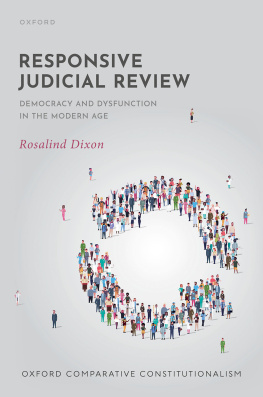
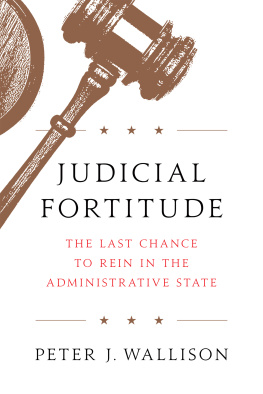
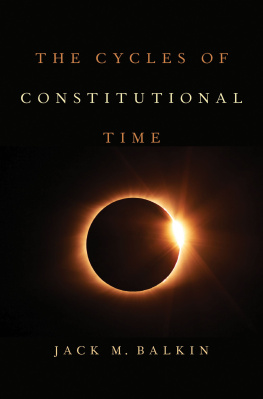
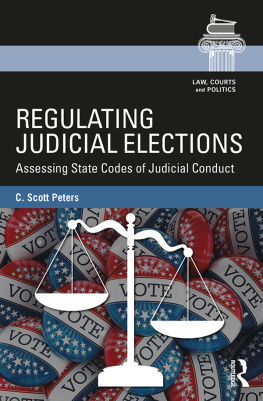
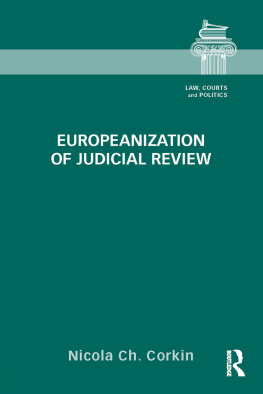
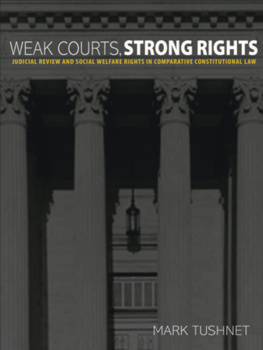
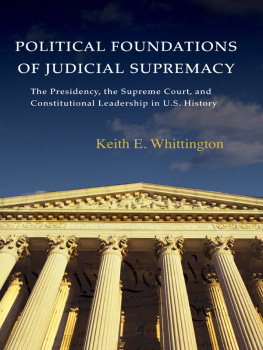
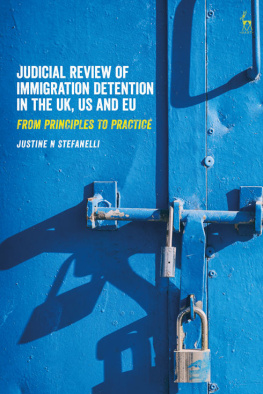
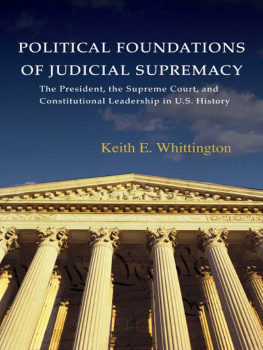


 ONE
ONE